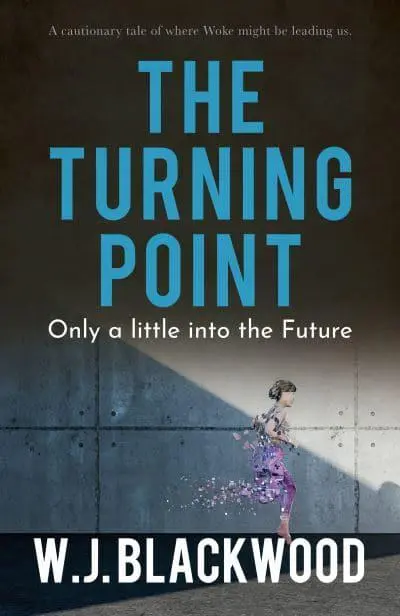John Blackwood is the author behind The Turning Point, a dystopian thriller that tackles some of the most pressing issues in modern society. What We Reading spoke to John to discuss everything from the influences behind The Turning Point, his love of James Hogg, to his writing hopes for the future!
Thanks for speaking with us, John! First off, tell us a bit about yourself and what led you to the world of writing.
I spent most of my time in the world of Meteorology and now am set up as a forensic meteorological Consultant. I live in the far northeast of Scotland. That is about as far as I am inclined to go with personal details although, or maybe because, my background is all fairly ordinary. I only very rarely buy works of fiction based on the blurb on the back cover when it’s of direct relevance to the plot – and the weather plays no part in The Turning Point.
Talk to us about The Turning Point. What is it about, and how was the process of bringing it to life?
I had become overwhelmed by the changes to society that have seemed to spring from nowhere in almost the last ten years or so. Above all, I am dismayed at the denial of the supremacy of reason and debate which is so openly a feature of the various utterly divergent forces tearing at society. This was the background to the Turning Point but the characters had a life of their own from the outset and the outline of the plot followed rapidly from that; doubtless influenced by these concerns and developing into almost an allegory.
The book follows a fightback by the hero and the many disparate friends she finds along the way. It follows their slow, and ultimately incomplete, realisation of what has been the cause of the sudden disruption of their lives and threats to their futures. This team of reluctant revolutionaries are very ordinary people. Even the opposing side is portrayed only as a very indistinct ‘organization’, concealed but present almost everywhere. The figures who represent it in the story are only from the ‘middle management’ level and all turn out to be ultimately expendable. This is not a political story and deals with no high-level figures or their power struggles.
The hero as such turned out to be a young woman from L.A. – I know that is forbidden these days – and would only claim that she evolved rather than was planned, but that once there, Judy seemed inevitable. She is not naive but is nevertheless trapped by a very clever plan to induce her into a high-end people trafficking designed not for profit but to give leverage to this organization. Her courier falls for her and this induces him to break all the rules and try to change her abduction into an escape for them both, which exists as a fantasy in his head alone. They end up, in a small village in Scotland where Judy has no idea that it was an attempted abduction and only the first suspicions about her courier’s motive. The courier is very soon violently eliminated by the organization. Judy ends up lodging with a deluded lawyer-turned-farmer and they are helped by a retired policeman. The farm is besieged by the diverse forces of modern protest.
None of them have any idea why they are there but they are vicious in their persecution. The siege is lifted by an army of hidden friends and is recorded and goes viral on the net. The trio set off back to the U.S. to try to unravel what happened to Judy. There, the growing public pressure, which exists only in the background of the book, helps them through a series of violent interactions with a retreating organization in which they emerge intact. The organization devours its own as it hides for another day.

What is the number one goal you want your work to have with readers?
To tell a good story, and through it, to alert the reader to what is happening around them.
What do you think makes you stand out as an author?
I think I am one of the few offering a thriller framework with a deeper story below about what is happening to us at present. The latter possibly has more plot twists than the one I have constructed on the surface.
What would you say has been your biggest success so far?
In the literary world, alas I have had none so far. And the other worlds will be of no real interest to someone who has looked up this site.
If you could go back in time to one book you read for the first time, what would it be and why?
The Private Memoirs and Confessions of a Justified Sinner, by James Hogg. (1824)
A truly remarkable book well ahead of its time but not much heeded today. It anticipates and even eclipses many of the trends in modern fiction.
I’m supposed to be plugging The Turning Point but, read it – you will be surprised.
What’s one tip you would give your younger self if you had the opportunity?
If you feel a compulsion to write – damn well do it.
And finally, what do you hope the future holds for you and your writing?
Not to be any kind of a ‘best seller’ but just to have a significant number of sales and have my stories entertain and my ideas considered.
Check out our interview with Aimee Menard
Part-time reader, part-time rambler, and full-time Horror enthusiast, James has been writing for What We Reading since 2022. His earliest reading memories involved Historical Fiction, Fantasy and Horror tales, which he has continued to take with him to this day. James’ favourite books include The Last (Hanna Jameson), The Troop (Nick Cutter) and Chasing The Boogeyman (Richard Chizmar).


